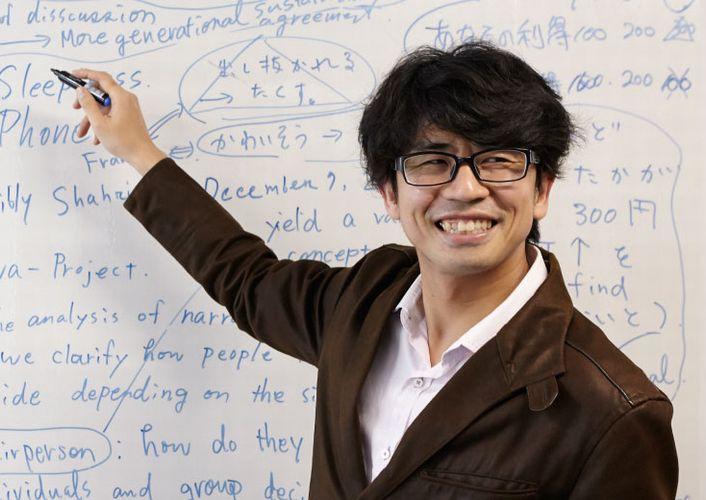- TOP
- Cutting-edge Research and Social Contribution
- Cutting-edge Research
- Proposing new systems and mechanisms aimed at creating a sustainable society

Proposing new systems and mechanisms aimed at creating a sustainable society

KOTANI Koji
- Specialized field
Environmental Economics, International Development and Experimental Economics
How can countries and societies strike a balance between achieving sustainability and efficiency/development?
Over the last 50 years, capitalism and democracy have become mainstream ideologies in the world and have brought economic development and diverse values to many countries. However, some serious problems that threaten the sustainability of countries and societies have emerged, including climate change, widening inequality, and excessive national debts. As Professor Kotani points out, "there are growing concerns around the world that sustainability may be sacrificed in our pursuit of efficiency and development." He is currently conducting research in economics that also incorporates perspectives from business administration, psychology, and the social sciences on the major theme of how countries and societies can strike a balance between achieving sustainability and efficiency/development.
"What kinds of new systems, mechanisms, and environments would allow countries and societies to take concrete actions to safeguard our sustainability? That is the question that underpins much of my research."
One of Prof. Kotani's research interests involves the nature of markets and transactions. In the past, only transactions that have been negotiated in a face-to-face manner by buyers and sellers were performed. Now, with the advent of Internet auctions and online sales platforms, an increasing number of transactions as well as resales and arbitrages take place without buyers and sellers knowing the other person's identity. In situations where a large number of resales occurs, wouldn't the sustainability of society be compromised by the consumption of resources and time accompanying the transaction, in addition to the lack of responsibility towards and trust of the other party that used to exist in face-to-face transactions? To explore this question, Prof. Kotani has examined the harmful effects of the possibility of resales and profit-driven transactions, and employed methods from experimental economics to find means by which market transactions can take place in a manner that does not compromise social sustainability, efficiency, or development. "I am interested in considering the kinds of market transaction formats that are better for society and individuals, and proposing new mechanisms for them," he said enthusiastically.
Elucidating the reason for compromised sustainability from the differences between urban and rural areas
In the first place, what is the reason that has led to the state of compromised sustainability today? Prof. Kotani has conducted experiments on this subject in Japan, China, Bangladesh, Indonesia, and Nepal in an attempt to find some clues on how human society has evolved in the different settings of urban and rural areas. The results of his experiments found that a larger proportion of people born in rural areas demonstrate "altruistic" behavior where they are more concerned with the well-being of others over themselves, as compared to those born in urban areas.
To investigate the reason behind the difference in the respective proportions of altruistic individuals in urban and rural areas, Prof. Kotani collected saliva samples from 600 subjects for DNA gene sequencing to determine whether their altruism was genetically innate or an acquired quality. The idea behind this is that altruism is an important quality for creating a sustainable society.
"If altruism turns out to be an acquired quality, its development would be contingent on the conditions in which an individual was raised. This would suggest that it is essential to create an environment that would allow people in urban areas in particular to develop altruism."
While it has been said that 70% of the global population will be concentrated in the urban areas of Asia and Africa in the future, Prof. Kotani points out the importance of realizing that unless we seriously consider what kind of society people in urban areas would create, it is impossible to ensure that society will be sustainable. This is also the reason why Prof. Kotani has focused on proposing social systems and mechanisms that would raise awareness of the importance of sustainability among people in urban areas.
Developing the "perspectives of future generations" is key to raising awareness of the importance of sustainability
As a member of the Research Institute for Future Design, Prof. Kotani has proposed a number of systems and mechanisms in his research, of which one is the focus on helping "individuals develop the perspectives of future generations before they evaluate phenomena arising within their own generation." Experimental results have shown that groups equipped with the perspectives of future generations make more sustainable choices than groups without these perspectives. "Taking into account the interests of future generations is actually a responsibility we owe to them. If we can implement an educational system that allows others to recognize this, I believe it will produce a noticeable effect," Prof. Kotani said.
Furthermore, experiments have shown that if the actions of the current generation have a huge impact on future generations, the institutionalization of a system of "accountability" will also significantly alter the behaviors and attitudes of people.
"It is imperative to transform our short-sighted approach into a long-term perspective that takes into account the interests of future generations by incorporating new systems and mechanisms into our representative democracy and evolving our educational system. I strongly believe that our society will become even better if the behaviors of more people are informed by the parallel axes of the past, present, and future," Prof. Kotani concluded.
